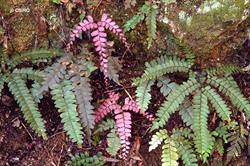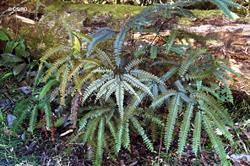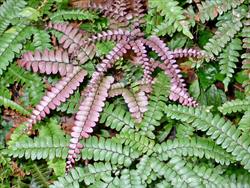Pteridaceae
Australian Tropical Ferns and Lycophytes - Online edition
Adiantum silvaticum




Adiantum silvaticum Tindale
Link to Australian Plant Name Index for publication details and synonyms: https://id.biodiversity.org.au/name/apni/76646
Maidenhair Fern
Rhizome creeping, much-branched, c. 5 mm diam.; scales golden brown, concolorous, with shortly ciliate margins and setose apices. Fronds scattered, to 80 cm long. Stipe to 65 cm long, glossy, sometimes scabrous proximally. Lamina 2- or 3-pinnate at the base, triangular to pentagonal, 15–30 cm long, 15–30 cm wide, herbaceous to coriaceous, bright green or bluish green; rachis glossy and glabrous abaxially, black or with dark purple hue, densely clothed with antrorse red-brown hairs adaxially (rarely partially or completely glabrous). Higher order segments hastate or narrowly to broadly triangular. Primary pinnae all ±same length and degree of branching. Pinnules symmetric and flabellate, or dimidiate and trapeziform to rectangular with blunt or upcurved apices, glabrous, often glaucescent but never glaucous abaxially; veins arising in part from basiscopic submarginal vein. Sori 1–10 along the distal margins, commonly 1 per lobe; soral flaps rectangular to subreniform, glabrous. Spores yellow; perine finely granulose, loosely adhering to exine; largest diam. (31–) c. 42 (–58) µm.
Endemic to eastern
Terrestrial in rainforest, often growing in decomposed granite or rhyolite or among rocks adjacent to watercourses.
This species is cultivated as an ornamental fern in tropical, subtropical and temperate areas. It can be grown in a container or in the ground in a shadehouse or in a shaded moist part of the garden.
Key to some Adiantum species of tropical
1a. Fronds pinnate = Adiantum philippense
1b. Fronds bipinnate or higher = 2
2a. Pinnules flabellate to rounded = 3
2b. Pinnules obliquely oblong to rhomboid = 5
3a. Soral flaps broadly attached to lamina and situated on the ends of lobes with incisions between them = Adiantum capillus-veneris
3b. Soral flaps reniform and narrowly attached to lamina and situated in incisions of the lamina margin with lobes between them = 4
4a. Rhizome long creeping, rhizome scales translucent with entire margins, plants stoloniferous and spreading, pinnae pale bright green when mature = Adiantum aethiopicum
4b. Rhizome short creeping, rhizome scales opaque with denitculate margins, not stoloniferous plants tufted, pinnae dark green when mature = Adiantum atroviride
5a. Rhizome long creeping, fronds scattered = 6
5b. Rhizome not long creeping, fronds tufted = 7
6a. Primary pinnae progressively reducing in length from base to apex of frond resulting in a triangular lamina = Adiantum formosum
6b. Primary pinnae equal in length resulting in an ovate lamina = Adiantum silvaticum
7a. Pinnae soft and membraneous with fine black hairs on the undersurface, root tubers present, often proliferous, stipe smooth = Adiantum diaphanum
7b. Pinnae herbaceous to coreaceous with white hairs, root tubers absent, not proliferous, stipe not smooth = Adiantum hispidulum
Field AR, Quinn CJ, Zich FA (2022) Australian Tropical Ferns and Lycophytes. apps.lucidcentral.org/fern/text/intro/index.htm (accessed online INSERT DATE).
Field AR, Quinn CJ, Zich FA (2022) ‘Platycerium superbum’, in Australian Tropical Ferns and Lycophytes. apps.lucidcentral.org/fern/text/entities/platycerium_superbum.htm (accessed online INSERT DATE).







